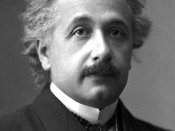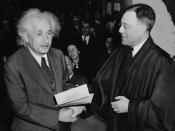Essay
I am for knowledge
Is knowledge dangerous? Can knowledge get you killed? Some of you may look at these questions and think "why would knowledge be dangerous?" While I think knowledge may be safe, it can (infact) be very dangerous.
There was a study to observe how toddlers reacted to bad vs. good acts. Puppets were used as props and were used to display good and bad acts. A significant percentage of the babies chose the puppet that has done the bad act. Could this knowledge of the babies motivate (in the future) them to do dangerous things?
Knowledge can be dangerous. Too much knowledge can lead to someone getting their feelings hurt or worse. "A lot of knowledge can be a dangerous thing." said Albert Einstein.
Knowledge to a kid can be harmless but in certain situations it could lead to dangerous acts. "A 5 year old may well understand what is required at a basic how to drive a car, but he does not have the wisdom, maturity, and physical capacity to do it well of safely."
Said Robert Hogwood. They have the knowledge to know that if they get behind the wheel, there could be consequences.
Knowledge is also not a dangerous thing because without it our world would not grow and we would not survive as well as we are now. "A slow approach could help scientists better exploit the knowledge of molecular interactions." Said in an article at nature.com.
Knowledge is very helpful because without it we would still be walking to places and sending letters instead of sending a simple text message. "Knowledge has improved technology and has made a great change in history." Said in an article at hongkiat.com.
It is recommended that we continue to gain more wisdom and knowledge. Knowledge is very helpful and we should not discontinue the urge to gain more knowledge. Our world is continuing to grow. Knowledge is the only thing we rely on to make this world a better place. "A people without the knowledge of their past history, origin and culture is like a tree without roots." Said Marcus Garver.


